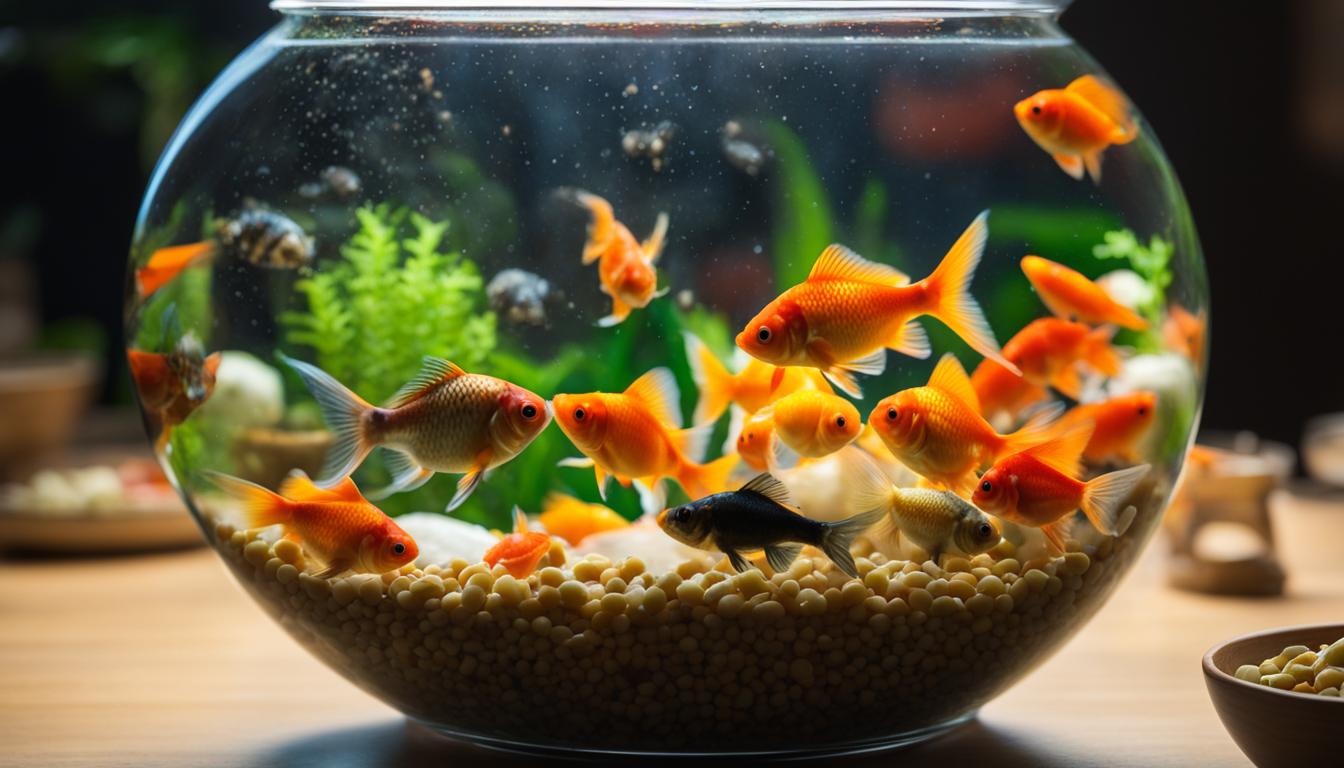Last Updated on 2 years by admin
When it comes to feeding your goldfish, choosing the right food is essential for their health and well-being. One common question that arises is whether fish flakes are bad for goldfish. In this guide, we will explore the pros and cons of fish flakes and provide you with a comprehensive goldfish diet guide.
Key Takeaways:
- Fish flakes can be used as part of a goldfish’s diet but should not be the sole food source.
- Pellets are generally a better option than flakes as they hold their nutrition better.
- Goldfish require a balanced diet with the right levels of protein, fats, and carbohydrates.
- Overfeeding can lead to obesity and water quality issues, so it’s important to feed the appropriate amount.
- Monitoring your goldfish’s body condition and adjusting their diet as needed is crucial for their overall health.
The Importance of Choosing the Right Goldfish Food
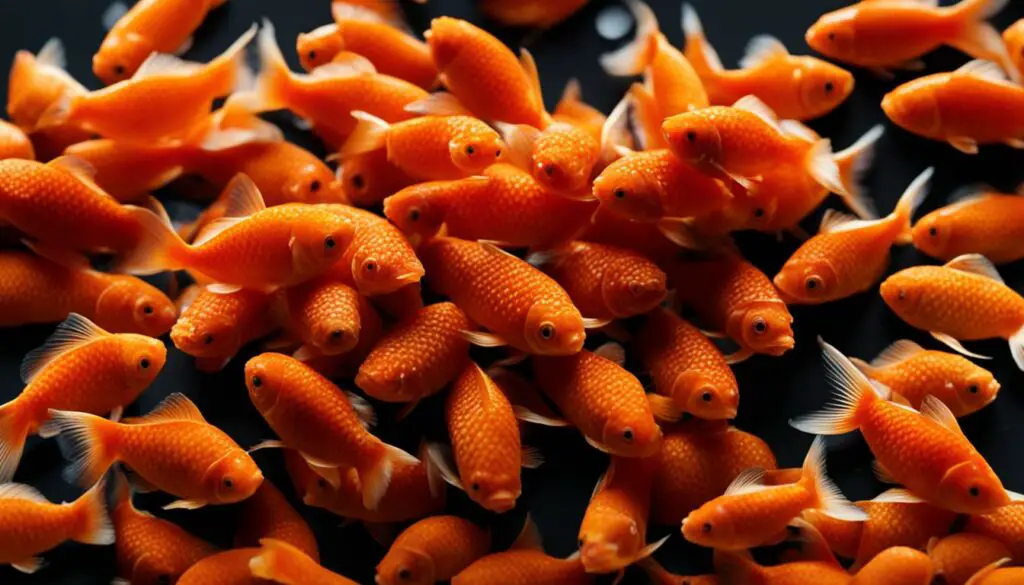
When it comes to keeping your goldfish healthy and thriving, one of the most critical factors to consider is their diet. Choosing the right goldfish food is essential for their overall health and well-being. Goldfish are omnivores and will eat almost anything, but it’s important to provide them with high-quality, nutritious food.
Pellets are generally a better option than flakes when it comes to goldfish food. They have a lower surface-to-mass ratio, which means they hold their nutrition better. Additionally, pellets are available in different sizes, making it easier to find the right size for your goldfish. Fancy goldfish, with their more compacted body shapes, may benefit from sinking pellets, which are easier for them to eat and digest.
Offering a variety of food in your goldfish’s diet is also important. Defrosted frozen foods like bloodworms, brine shrimp, and daphnia can be included as treats. Green vegetables and algae wafers are also great options to provide additional nutrients. It’s important to soak dry food for a minute or two before feeding to prevent it from swelling up in your fish’s stomach.
| Goldfish Food Options | Key Benefits |
|---|---|
| Pellets | Hold their nutrition better; available in different sizes |
| Flakes | Can be used as part of a varied diet; hold less nutrition; prone to spoilage |
| Defrosted Frozen Foods | Provide variety and additional nutrients |
| Green Vegetables | Offer essential vitamins and minerals |
| Algae Wafers | Contain essential nutrients and promote natural feeding behavior |
Remember, monitoring your goldfish’s body condition and adjusting their diet accordingly is crucial for their overall health and well-being.
Summary
Choosing the right goldfish food is vital for their health. Pellets are generally better than flakes, as they hold their nutrition better and are available in different sizes. Offering a varied diet that includes defrosted frozen foods, green vegetables, and algae wafers can provide additional nutrients. Always monitor your goldfish’s body condition and adjust their diet as needed to ensure optimal health.
The Pros and Cons of Pellets vs. Flakes
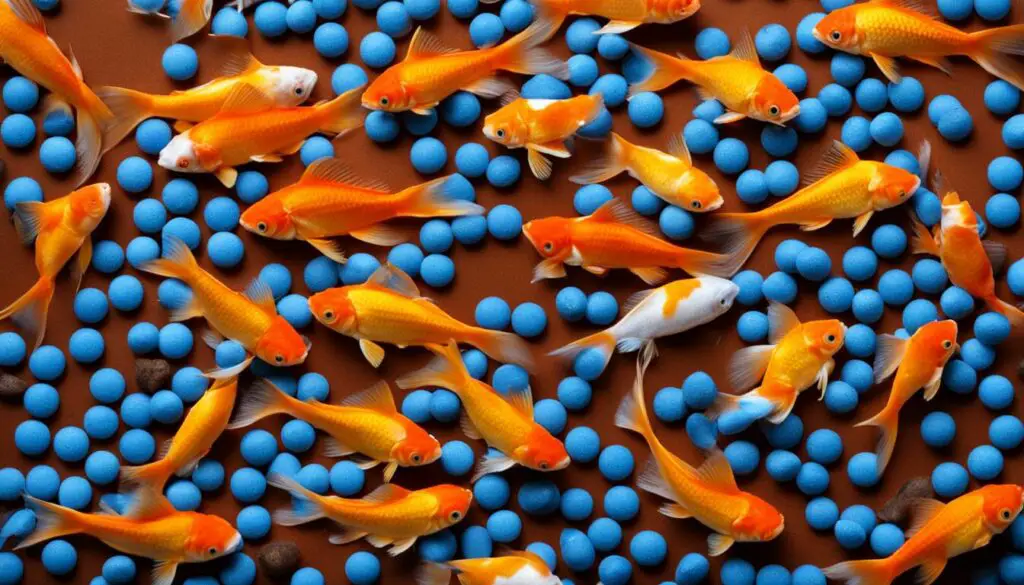
When it comes to choosing the right food for your goldfish, the debate between pellets and flakes is a common one. Both options have their pros and cons, so let’s take a closer look.
Pellets
Pellets are generally considered a better option than flakes for several reasons. Firstly, pellets have a lower surface-to-mass ratio, which means they hold their nutrition better and are less likely to dissolve instantly when they come into contact with water. This not only helps to prevent water quality issues but also ensures that your goldfish is getting the maximum nutritional benefit from their food.
Secondly, pellets come in different sizes, making it easier to find the right size for your goldfish. This is especially important for goldfish with specific dietary requirements or those who may have difficulty consuming larger pellets.
Lastly, sinking pellets can be a good option for goldfish that have difficulty competing with other fish at feeding time or those with floating issues. Sinking pellets ensure that the food reaches the bottom of the tank where these goldfish can easily access and consume it.
Flakes
While pellets may have their advantages, flakes also have their place in a goldfish’s diet. Flakes are readily available in the market and can be a convenient option for many goldfish owners. However, it’s important to note that flakes have a higher risk of spoilage compared to pellets, and their vitamin content tends to decrease faster.
When feeding flakes, it’s recommended to hold them under the water surface to release them and prevent them from floating at the surface. This can help ensure that your goldfish can easily eat the flakes without them being wasted or causing any water quality issues.
| Pros of Pellets | Cons of Pellets |
|---|---|
| – Lower surface-to-mass ratio, holds nutrition better | – Limited availability of sizes |
| – Easier to feed sinking pellets | – May not be suitable for all goldfish |
| – Less likely to cause water quality issues |
| Pros of Flakes | Cons of Flakes |
|---|---|
| – Convenient and readily available | – Higher risk of spoilage |
| – Can be easily consumed by goldfish | – Faster decrease in vitamin content |
Ultimately, the choice between pellets and flakes depends on your goldfish’s specific needs and preferences. Some goldfish may thrive on a pellet diet, while others may prefer flakes. It’s always a good idea to offer a varied and balanced diet to ensure your goldfish is getting all the nutrients they require for optimal health.
Feeding Guidelines for Goldfish
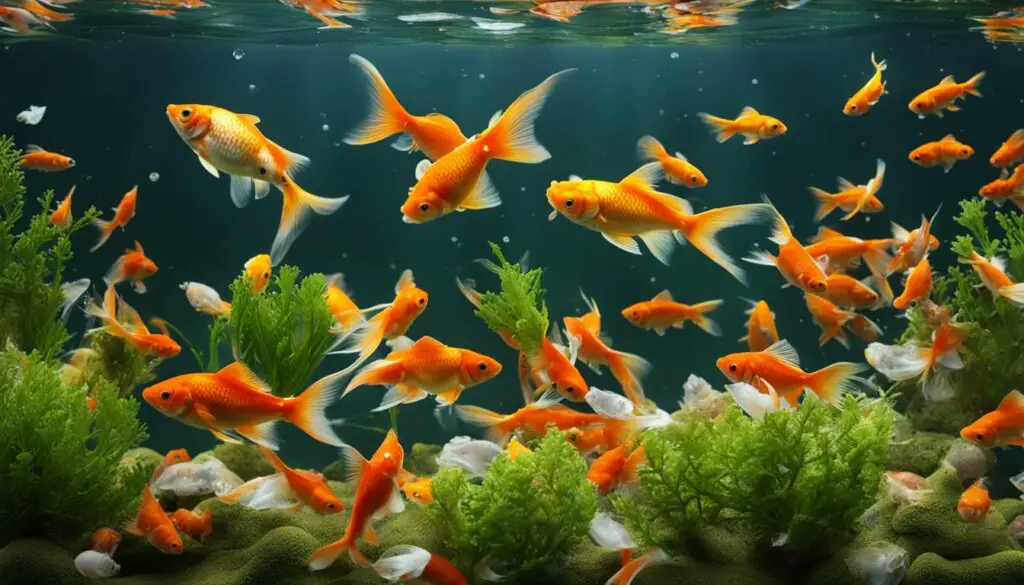
Feeding your goldfish the right way is essential for their health and well-being. To ensure that your goldfish receives the proper nutrition, it’s important to follow some feeding guidelines. Here are some key points to keep in mind:
1. Consider the water temperature:
The water temperature in your goldfish tank can influence how often and how much you should feed them. In lower temperatures (below 23 degrees Celsius), once-a-day feeding is usually sufficient. However, in higher temperatures, your goldfish may require twice-a-day feedings to meet their nutritional needs.
2. Avoid overfeeding:
Overfeeding can lead to obesity and water quality issues. It’s better to feed your goldfish small amounts that they can consume within a few minutes. This prevents uneaten food from polluting the water and helps to maintain a healthy weight for your fish.
3. Choose the right food:
Goldfish require a diet with around 30% protein for maintenance. However, juvenile goldfish and breeding fish may need a higher protein level, around 35%. It’s important to select a goldfish food that provides the appropriate protein content. Also, look for a balanced nutrient profile that includes fats and carbohydrates.
| Pellets | Flakes | |
|---|---|---|
| Pros | Pellets have a lower surface-to-mass ratio, which helps them hold their nutrition better. | Flakes are usually more readily available in pet stores. |
| Cons | Flakes tend to dissolve instantly on contact with water, causing potential water quality issues. | Flakes may spoil faster and have a faster decrease in vitamin content compared to pellets. |
Remember to monitor your goldfish’s body condition and adjust their feeding accordingly. By following these feeding guidelines, you can help keep your goldfish healthy and thriving.
Choosing the Right Goldfish Food for Your Fish’s Health
When it comes to the health of your goldfish, choosing the right food is essential. A balanced diet is crucial for their overall well-being and can help prevent health issues in the long run. The right goldfish food should provide the necessary nutrients to support their growth, maintain their health, and enhance their colors.
A high-quality goldfish food should have a limited number of protein sources and provide essential amino acids. Goldfish do not have a high fat requirement, so it’s important to choose a food that contains healthy unsaturated fats like fish oil. Fiber should be limited in a goldfish diet, as their digestive system is not well-equipped to digest it. Opting for a goldfish food with a balanced nutrient profile will ensure that your fish gets the necessary vitamins and minerals to thrive.
| Key Considerations when Choosing Goldfish Food |
|---|
| 1. Protein content: Around 30% protein for maintenance, up to 35% for juvenile and breeding fish |
| 2. Fat content: Choose food with unsaturated fats like fish oil |
| 3. Fiber content: Limit fiber in the diet as goldfish have difficulty digesting it |
| 4. Nutrient profile: Look for a balanced diet that provides essential vitamins and minerals |
It’s also important to offer variety in your goldfish’s diet. Including defrosted frozen foods, green vegetables, and algae wafers can provide additional nutrients and keep their meals interesting. Live plants can also be a great addition to their environment, as they offer natural grazing opportunities and provide additional nutrition and fiber.
Remember to monitor your goldfish’s body condition and adjust their diet as needed. Overfeeding can lead to obesity and water quality issues, so feeding the appropriate amount is crucial. By choosing the right goldfish food and providing a varied, nutritious diet, you can help your fish stay healthy and vibrant.
The Impact of Diet on Goldfish Growth and Health
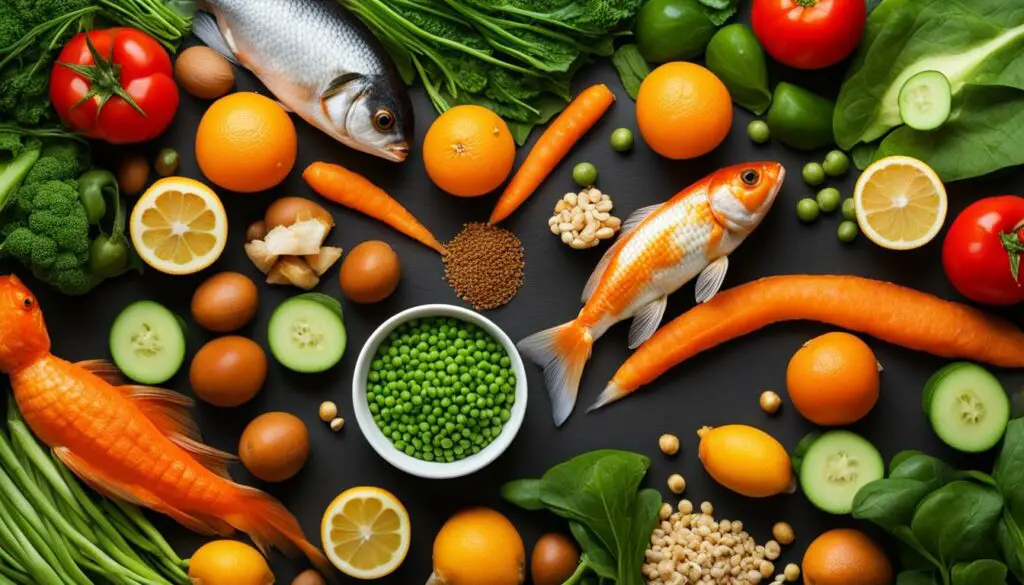
Providing a proper diet is essential for the growth and health of your goldfish. The right food can promote healthy growth and prevent common health issues. By understanding the impact of diet on goldfish, you can ensure that your pet thrives and lives a long, healthy life.
One of the key factors in goldfish growth is the protein content in their diet. A diet with around 30% protein is suitable for adult goldfish, while juvenile fish and breeding fish may require a higher protein level of around 35%. It’s important to choose a high-quality diet with few protein sources to meet their dietary needs.
Overfeeding can have detrimental effects on goldfish growth and health. While it may be tempting to provide large meals, it’s important to feed only what your goldfish can consume within a few minutes. Overfeeding can lead to obesity and water quality issues, which can impact the overall health of your fish. Monitor your goldfish’s body condition and adjust their feeding accordingly to prevent overfeeding and promote healthy growth.
| Impact of Diet on Goldfish Growth and Health | Key Points |
|---|---|
| Protein Content | Around 30% protein for adult goldfish, higher levels for juvenile and breeding fish. Few protein sources in the diet. |
| Overfeeding | Feed only what the goldfish can consume within a few minutes. Overfeeding can lead to obesity and water quality issues. |
By paying careful attention to your goldfish’s diet and feeding habits, you can support their growth and overall health. Providing a balanced and nutritious diet, monitoring their body condition, and adjusting their feeding as needed are all crucial steps in promoting the well-being of your goldfish.
The Role of Flakes in a Goldfish’s Diet
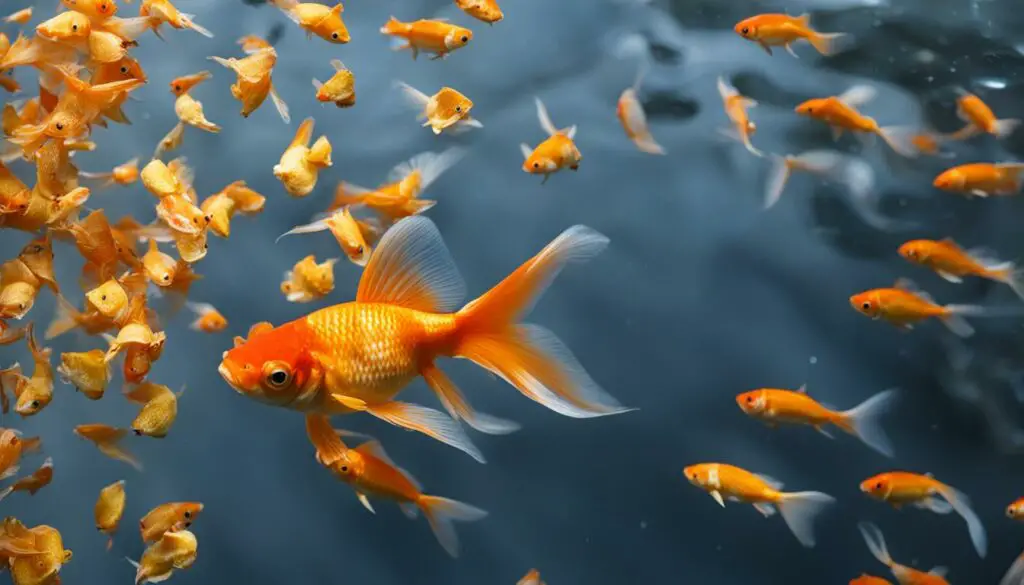
While pellets are generally considered a better option for goldfish due to their higher nutritional value and ability to hold their shape, flakes can still play a role in a goldfish’s diet when used properly. Flakes should not be the sole food source, but they can provide some variety and enrichment for your goldfish.
When feeding flakes, it’s important to take precautions to prevent them from floating at the surface of the water. You can hold the flakes under the water surface to release them, ensuring that your goldfish can easily reach and consume them. This helps to prevent excess flakes from being wasted and potentially causing water quality issues.
However, it’s important to note that flakes have a higher risk of spoilage compared to pellets, and their vitamin content can decrease at a faster rate. Water-soluble vitamins like vitamin C, in particular, can be more vulnerable in flakes. To ensure the best nutrition, store fish food in sealed containers in a cool environment and use it within the recommended time frame.
| Pros of Flakes | Cons of Flakes |
|---|---|
| Provide variety in a goldfish’s diet | Higher risk of spoilage |
| Easy to feed and handle | Faster decrease in vitamin content |
| Can be held under water to prevent floating | May cause water quality issues if not consumed |
Ultimately, including flakes as part of a varied and balanced diet can be beneficial for your goldfish. Just remember to prioritize pellets and other nutritious food options and take the necessary steps to ensure that your goldfish’s diet remains healthy and well-rounded.
The Feeding Habits of Goldfish
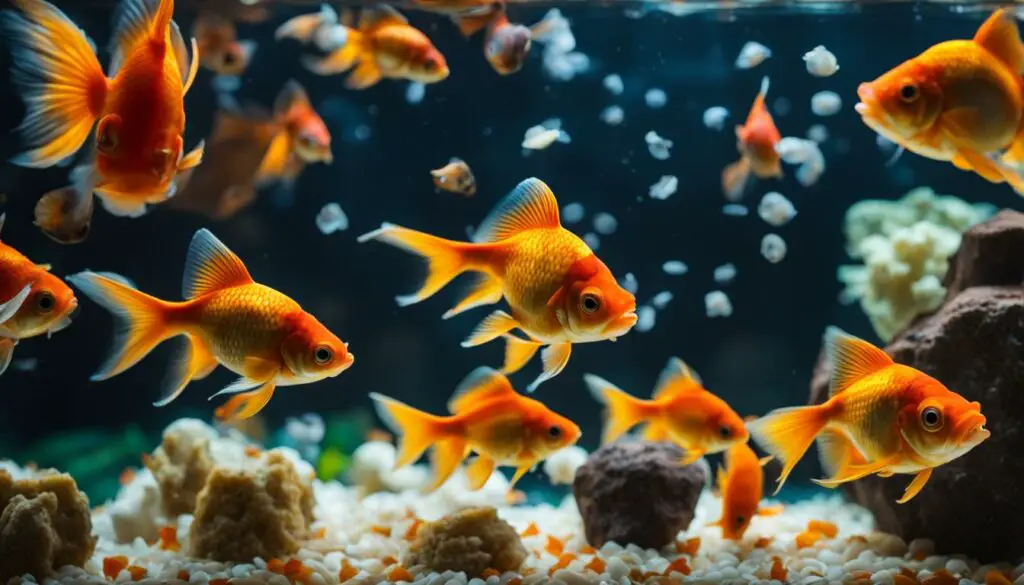
Understanding the feeding habits of goldfish is essential for providing them with a healthy and balanced diet. Goldfish are omnivorous creatures that have a varied appetite and can eat a wide range of foods. They have pharyngeal teeth at the back of their mouths, which they use to grind up their food. Goldfish are skilled sifters and can separate food from other debris before swallowing it. They may browse the tank for bits of food caught in plants or decor, or even look for small bugs or snails to eat. Goldfish may also browse the surface of the water for leftovers or tender bits of plants.
When it comes to the types of food they can consume, it’s important to consider the specific needs of your goldfish. Singletail goldfish tend to have more robust digestive systems and can eat a wider variety of food, including floating food like flakes. On the other hand, fancy goldfish with more compacted body shapes may have a harder time consuming floating food. For fancy goldfish, sinking pellets are often a better option as they are easier to consume and digest. Offering a varied diet that includes different types of food can help keep your goldfish active and healthy.
Feeding Tips for Goldfish:
- Choose the right-sized food for your goldfish, whether it’s pellets or flakes.
- Soak dry food for a minute or two before feeding to prevent it from swelling up in the fish’s stomach.
- Include defrosted frozen foods like bloodworms, brine shrimp, and daphnia as suitable treats.
- Add green vegetables like blanched broccoli, spinach, and peas to their diet.
- Consider giving algae wafers a try, especially when broken up and soaked before feeding.
- Explore commercial gel foods as an alternative to homemade options.
- Live plants like elodea can provide additional nutrition and fiber for your goldfish.
- Feed your goldfish smaller, frequent meals rather than one big meal to prevent overeating and reduce the risk of obesity.
- Monitor your fish’s body condition and adjust their diet as needed for optimal health.
By following these feeding habits and tips, you can ensure that your goldfish receives the nutrients they need for a healthy and thriving life.
Tips for Feeding Your Goldfish
Feeding your goldfish the right way is essential for their health and well-being. Here are some tips to help you ensure your goldfish gets the proper diet:
- Choose the right-sized food: Whether you’re feeding your goldfish pellets or flakes, make sure the size is suitable for their mouth. This will prevent choking and make it easier for them to eat.
- Soak dry food: If you’re feeding your goldfish dry food, like pellets, it’s a good idea to soak them for a minute or two before feeding. This helps prevent the food from swelling up in their stomach and causing discomfort.
- Offer variety: While pellets or flakes may be the main staple of your goldfish’s diet, it’s important to offer variety. Defrosted frozen foods like bloodworms, brine shrimp, and daphnia can be excellent treats. Green vegetables like blanched broccoli, spinach, and peas can also be included in their diet.
- Consider alternative options: If your goldfish is not fond of pellets or flakes, you can try alternatives like algae wafers or gel food. Algae wafers, when broken up and soaked, can provide a nice change in their diet. There are also commercial options for gel food available.
- Include live plants: Live plants, such as elodea, can be beneficial for your goldfish. They provide additional nutrition and fiber, as well as a natural environment for your fish.
- Feed smaller, frequent meals: Instead of feeding your goldfish one big meal, it’s recommended to feed smaller, frequent meals throughout the day. This helps prevent overeating and reduces the risk of obesity.
By following these feeding tips, you can ensure your goldfish receives a well-rounded and nutritious diet. Remember to monitor their body condition and adjust their diet as needed for optimal health.
“Feeding your goldfish the right way is essential for their health and well-being.”
| Type of Food | Benefits | Considerations |
|---|---|---|
| Pellets |
|
|
| Flakes |
|
|
| Alternative Options |
|
|
Conclusion
Choosing the right food for your goldfish is crucial for their overall health and well-being. When it comes to goldfish diet, pellets are generally a better option than flakes. They hold their nutrition better and have a lower surface-to-mass ratio, reducing the risk of floating disorders. Additionally, pellets are available in different sizes, making it easier to find the right size for your goldfish.
Offering a balanced diet is essential for goldfish growth and development. It should include the right levels of protein, fat, and carbohydrates. Monitoring your fish’s body condition and adjusting their diet as needed can help prevent health problems and ensure their optimal health. Overfeeding should be avoided, as it can lead to obesity and water quality issues.
By following these guidelines and providing a varied, nutritious diet, you can help your goldfish thrive and live a healthy, happy life. Remember to store fish food properly and use it within the recommended time frame to ensure optimal vitamin content. With the right diet and care, your goldfish will flourish and bring joy to your aquarium for years to come.
FAQ
Are fish flakes bad for goldfish?
Fish flakes can be a part of a goldfish’s diet, but they should not be the sole food source. Pellets are generally a better option, as they hold their nutrition better and have a lower surface-to-mass ratio. If you choose to feed flakes, you can hold them under the water surface to release them and prevent them from floating at the surface.
What is the importance of choosing the right goldfish food?
The food you feed your goldfish has a significant impact on its overall health and wellbeing. Goldfish have specific dietary requirements for optimal health, including a good balance of protein, fats, and carbohydrates. It’s important to choose a goldfish food with a balanced nutrient profile to meet their dietary needs.
What are the pros and cons of pellets vs. flakes?
Pellets are generally better for goldfish than flakes, as they have a lower surface-to-mass ratio and are less likely to cause floating disorders. Flakes tend to dissolve instantly on contact with water, which can lead to water quality issues. Pellets are available in different sizes, making it easier to find the right size for your goldfish.
What are the feeding guidelines for goldfish?
The frequency of feeding will depend on the water temperature, with lower temperatures requiring once a day feedings and higher temperatures requiring twice a day feedings. Overfeeding can lead to obesity and water quality issues, so it’s important to feed only what your goldfish can eat in a few minutes.
How do I choose the right goldfish food for my fish’s health?
It’s important to look at the ingredient label and consider the guaranteed analysis and list of ingredients when choosing food for your goldfish. Goldfish require a diet with around 30% protein for maintenance, while juvenile goldfish and breeding fish may need a higher protein level around 35%. It’s critical to count the number of protein sources in the ingredient list and choose higher quality diets with fewer protein sources.
What is the impact of diet on goldfish growth and health?
The right diet plays a crucial role in the growth and health of your goldfish. Feeding a high-protein diet can lead to fast growth, but it can also result in excess ammonia production and water quality issues. Goldfish should have smaller, frequent feedings rather than one big meal a day. Monitoring your fish’s body condition and adjusting their diet accordingly is important for maintaining their health.
What is the role of flakes in a goldfish’s diet?
Flakes can be a part of a goldfish’s diet, but they should not be the sole food source. Pellets are generally a better option, as they hold their nutrition better and have a lower surface-to-mass ratio. Flakes have a higher risk of spoilage and a faster decrease in vitamin content compared to pellets.
What are the feeding habits of goldfish?
Goldfish are omnivorous and will eat almost anything, but it’s important to choose high-quality, nutritious food. They have pharyngeal teeth at the back of their mouth that they use to grind up their food. Goldfish may also browse the tank for bits of food caught in plants or decor, or even look for small bugs or snails to eat.
What are some tips for feeding my goldfish?
It’s important to store fish food in sealed containers in a cool environment and use it within one to six months to ensure optimal vitamin content. Goldfish should be fed small amounts that can be consumed within a few minutes. It’s important to keep an eye on your fish’s body condition and adjust their diet accordingly. Offering a varied diet that includes different types of food can help keep your goldfish active and healthy.
What is the conclusion about goldfish diet?
The food you feed your goldfish plays a crucial role in their growth and overall health. It’s important to choose a balanced and nutritious diet, whether you prefer pellets or flakes. Monitoring your fish’s body condition and adjusting their feeding accordingly is important for preventing health issues and ensuring their optimal health.
Source Links
- https://www.thesprucepets.com/what-food-is-healthy-for-goldfish-5215455
- https://injaf.org/aquarium-fish/the-goldfish-section/goldfish-and-their-diet/
- https://cafishvet.com/fish-tanks/what-do-you-feed-goldfish/

